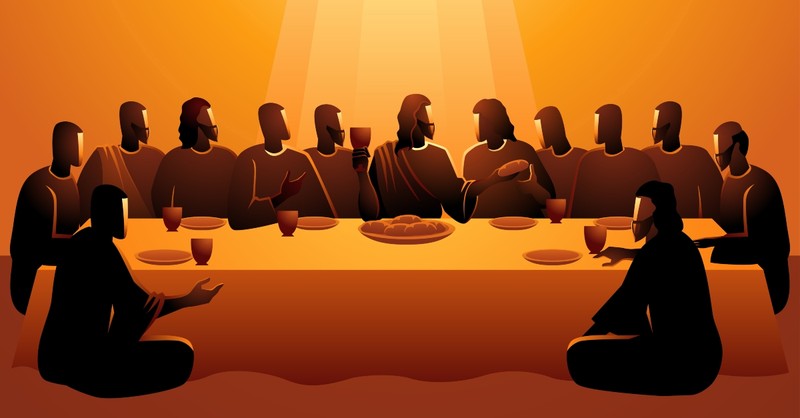
Jesus’ horrific death is often referred to as the “passion” of Christ, a phrase that instantly evokes powerful images of a love so strong and unyielding, it drove our Savior to the cross. Originally, this phrase arose from the Latin pati, which means “able to suffer.” And yet, our modern definition of a “strong feeling” fits all Jesus did on that first Good Friday. Because of His love, which defies definition, He endured the unimaginable, for us. This truth penetrates much deeper when we realize His anguish was all part of His plan, from the beginning of time. Seeing all that laid ahead, knowing all His precious and sinless Son would endure.
Before Pilate or Judas or the high priest Caiaphas took their first breath, Jesus saw it all: His agony in the Garden of Gethsemane as He cried out in anguish to God the Father. His arrest and unjust trial. The crown of thorns pressed into his scalp and the flogging. His journey to Golgotha. The rage-filled faces of those who mocked Him as they cried, “Crucify Him!” Knowing His creation would rebel against Him, making this final sacrifice necessary, God still breathed life into mankind.
He chose to create you and I, the very ones for which He died.
And He detailed everything throughout the pages of Scripture, carefully preserved long before the Roman soldiers drove that first nail into His flesh to eliminate all logical doubt. In each prophecy, Jesus proved that He is indeed who He says He is and did exactly what He long promised to do.
Our salvation wasn’t an afterthought. God planned each moment of Christ’s suffering and His victory over death before time began. Then He saturated Scripture with this beautiful love story so that you and I would understand the depths of His mercy. Hundreds of years before that dark Friday, God’s prophets clearly proclaimed the coming of God’s “suffering servant” who would come to conquer sin and soften hearts of stone.
Here are 6 Biblical Prophesies that predicted Jesus and the cross.
Photo Credit: © Getty Images/jchizhe

1. He would be betrayed by someone close to Him.
Many prophesies in Scripture have dual fulfillment and speak of events during the author’s life while predicting the life and death of Christ. Psalm 41 is a great example. Speaking of a man who once served as his royal counsellor who later turned against him, David wrote, “Even my close friend, someone I trusted, one who shared my bread has turned against me.”
Just over 1,000 years later, Jesus experienced a similar betrayal. Knowing all that lay ahead, Jesus told His disciples, “As you know, the Passover is two days away—and the Son of Man will be handed over to be crucified” (Matthew 26:1, NIV.) The religious leaders gathered to plot Christ’s arrest and execution. Apparently aware of their scheming, Judas “went to the chief priests and asked, ‘What are you willing to give me if I deliver Him over to you.” And for thirty pieces of silver, Judas began looking for an opportunity to betray our Savior.
Aware of the betrayal to come, Jesus gathered Judas and the other disciples into an upper room to share a sacred meal. Then, while they were reclining at the table, told them plainly that one of them would betray Him. In John 13:18, Jesus said, “I am not referring to all of you; I know those I have chosen. But this is to fulfill this passage of Scripture: ‘He who shared my bread has turned against me.’” (NIV).
As Psalm 41 predicted, Jesus was betrayed by a close friend who literally shared His bread.
Photo Credit: © Getty Images/rudall30

2. He would be betrayed for 30 pieces of silver.
"I told them, 'If you think it best, give me my pay; but if not, keep it.' So they paid me thirty pieces of silver. And the LORD said to me, 'Throw it to the potter'—the handsome price at which they valued me! So I took the thirty pieces of silver and threw them to the potter at the house of the LORD." (Zechariah 11:12-13)
"Jeremiah said, 'The word of the LORD came to me: Hanamel son of Shallum your uncle is going to come to you and say, "Buy my field at Anathoth, because as nearest relative it is your right and duty to buy it." Then, just as the LORD had said, my cousin Hanamel came to me in the courtyard of the guard and said, "Buy my field at Anathoth in the territory of Benjamin. Since it is your right to redeem it and possess it, buy it for yourself." I knew that this was the word of the LORD; so I bought the field at Anathoth from my cousin Hanamel and weighed out for him seventeen shekels of silver.'" (Jeremiah 32:6-9)
Scholars believe Zachariah 11:12-13 and Jeremiah 32:6-9 pointed to Christ as well. These passage, referenced in to a time when the Jeremiah received, for his wages, what one might’ve paid for a slave. While this insulted the prophet, God used the situation to foretell the later betrayal of His son.
As is often the case with Scripture, this one prophesy involves a bigger story. When Matthew referenced the potter’s field in chapter 26, his listeners probably thought of Jeremiah 18 that speaks of God being the potter and mankind being His clay. They likely would’ve remembered the two interconnected accounts from Jeremiah and Isaiah and how God’s people had forsaken Him outside the Potsherd Gate of Jerusalem. Just as innocent blood had been shed in Jeremiah 19:1-4, so too the sinless Savior had shed His blood for us.
Speaking of these passages, Dr. Karl Pagenkemper former Academic Dean of Grace University states, “Just as the Jews rejected Jeremiah’s and Zechariah’s prophecies, Judas and the Rabbis find themselves opposing God and under judgment. Just as with Jeremiah and Zechariah, Jesus attempts to lead the people with His shepherding ministry, but ends up a suffering innocent.”
Photo Credit: © Getty Images/gabrielabertolini

3. He would be rejected as the Messiah.
In Isaiah 53, the ancient Hebrew prophet predicts the coming of God’s “suffering Servant,” stating, “Who has believed our message and to whom has the arm of the Lord been revealed?” (v. 1) Verses 3-4 expand on mankind’s disbelief when it says, “He was despised and rejected by mankind, a man of suffering, and familiar with pain. Like one from whom people hide their faces He was despised, and we held him in low esteem. Surely He took up our pain and bore our suffering, yet we considered Him punished by God, stricken by Him, and afflicted.”
Hanging on the cross, with a criminal on His left and another on His right, He did indeed appear stricken by God. But He wasn’t. He was chosen, the anointed One. The long promised Savior.
While from the royal line of David and God’s ultimate High Priest, that wasn’t how Jesus chose to reveal Himself to the world. Instead, He came humbly to an impoverished couple few knew or had heard about. He didn’t strut about in fancy priestly garments or spend his time with the religious elite. When others tried to force Him into a position of power, He quietly slipped away, modeling instead a life of service. The people’s expectations blinded them to the truth His words and miracles proclaimed—that He was the great I Am, God’s Son, sent to set us free.
The same disbelief keeps many enslaved to sin today, despite the many proofs God has given us for the gospel. In this, I’m reminded of Luke 16, one of the saddest sections in Scripture. In this passage, Jesus tells of a rich man who lived in luxury and a poor man who lived in torment. Upon his death, the angels carried the beggar “to Abraham’s side” while the rich man went to Hades. In torment, he begged Abraham to send the peasant to warn his still living family, so that they wouldn’t experience the same suffering.
Consider the irony verses 29-30 revealed in the dialogue that followed:
“Abraham replied, ‘They have Moses and the Prophets; let them listen to them.’
“‘No, father Abraham,’ he said, ‘but if someone from the dead goes to them, they will repent.’”
“He said to him, ‘If they do not listen to Moses and the Prophets, they will not be convinced even if someone rises from the dead.’”
Jesus, the One who would soon die and rise again, told this story to sneering Pharisees, knowing most of them would still reject Him, even after the resurrection. I imagine He was thinking of some of our friends, neighbors and family members as well, some who might one day read this article of Messianic prophecies, written by a life He publicly transformed.
Photo Credit: ©iStock/Getty Images Plus/1971yes

4. He would be pierced.
In Isaiah 53, the prophet also said, “But He was pierced for our transgressions, He was crushed for our iniquities; the punishment that brought us peace was on Him, and by His wounds we are healed” (Isaiah 53:5). Writing around 700 years before Christ’s birth, long before Romans drove nails into Christ’s hand and feet and drove a sword into His side, the prophet spoke vividly of our Savior’s death. John 19:34-37 tells us “one of the soldiers pierced Jesus’ side with a spear, bringing a sudden flow of blood and water. The man who saw it has given testimony, and His testimony is true. He knows that he tells you the truth, and he testifies that you also may believe. These things happened so that the Scripture would be fulfilled: ‘Not one of His bones will be broken (Ex. 12:46; Num 9:12; Ps. 34:20),’ and as another Scripture says, ‘They will look on the One they have pierced (Zechariah 12:10)’” (NIV).
One could write an entire book on all the prophesies Christ fulfilled on that first dark yet glorious Good Friday. I’ve discussed those I find most significant from a heart level. For those wanting to investigate these powerful proofs of the gospel further, I’ll share more below. For a more complete list, I encourage you to check out chapter 9 of Josh McDowell’s Evidence that Demands a Verdict.
Additional prophesies:
5. People would cast lots for His clothes.
Predicted in Psalm 22:18, written around 1,000 years before Christ’s birth, which states, “They divided my clothes among them and cast lots for my garment.”
Fulfilled in John 19:23-24, when the soldiers “took His clothes, dividing them into four shares, one for each of them, with the undergarment remaining. This garment was seamless, woven in one piece from top to bottom. ‘Let’s not tear it,’ they said to one another. ‘Let’s decide by lot who will get it’” (NIV).
Photo Credit: © Getty Images

6. He Would Be Silent before His accusers.
Predicted in Isaiah 53:7, written between 740-680 BC says, “He was oppressed and afflicted, yet He did not open His mouth; He was led like a lamb to the slaughter, and as a sheep before its shearers is silent, so He did not open His mouth” (NIV).
Fulfilled in numerous places. Matthew 26:62-63a says, “Then the high priest stood up and said to Jesus, ‘Are You not going to answer? What this testimony that these men are bringing against you?’ But Jesus remained silent” (NIV). Matthew 27:12 tells us, “When He was accused by the chief priests and the elders, He gave no answer” (NIV). Then He reached Pilate, who wanted to find a reason to release Him. Mark 13:4-5 states, “So again Pilate asked Him, ‘Aren’t you going to answer? See how many things they are accusing You of?’ But Jesus still made no reply, and Pilate was amazed” (NIV).
God revealed His Son and the glorious gift of salvation He’d offer throughout the pages of Scripture, to provide you and I with ample proof that Jesus is who He says He is and did what He said He’d do. The cross of Christ is a powerful image of God’s ultimate promise kept. The God who quite literally moved heaven and earth to reconcile us to Himself will return to take us to our heavenly home. That’s a promise we can bank our eternity on.
Photo Credit: © Getty Images/rudall30
Originally published Thursday, 25 March 2021.









